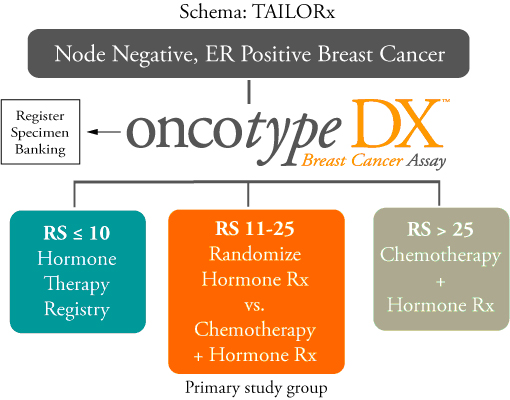Raadpleeg ook literatuurlijst specifiek bij borstkanker van arts-bioloog drs. Engelbert Valstar.
12 november 2018: Lees ook dit artikel:
28 september 2018: lees het advies van het Zorginstituut om de mammaprint uit de basisverzekering te halen.
12 november 2018: Bron:
Resultaten uit Genentest Oncotype DX bij hormoongevoelige borstkanker stadium I tot III houden direct en lineair verband met kans op overlijden aan de ziekte.
Genentesten als mammaprint en Oncotype DX worden aanbevolen om deze aanvullend op de diagnose te maken bij borstkanker bij hormoongevoelige borstkanker (ER pos. en/of PR pos. en HER2 neg). Zeker als er sprake lijkt van aangetaste lymfklieren, met name in de oksel, wordt een genentest aanbevolen. (Mammaprint wordt in Nederland nog altijd vergoed, maar staat wel ter discussie na de uitspraken van het Zorginstituut om de mammaprint uit de basisverzekering te halen).
De Oncotype DX is een vergelijkbare genentest en uit een in Amerika uitgevoerde retrospectieve studie bij totaal 73.185 borstkankerpatiënten met borstkanker stadium I tot III blijkt dat de scores uit de genentest op de kans op een recidief direct en lineair verband houden met de kans om te overlijden en of er wel of geen chemotherapie moet worden gegeven. Tekst loopt door onder beeld.
 Source: Oncolink
Source: Oncolink
Interessant in dit verband is ook een het artikel uit Medisch Contact te lezen over een studie uit het Nederlandse Izkaraziekenhuis die met de Oncotype DX genentest werken:
De resultaten uit het abstract van de retrospectieve studie in Amerika:
Chemotherapie werd geassocieerd met een verlaagd risico op overlijden bij die patiënten die ook uitzaaiingen in de lymfklieren hadden. (hazard ratio 0.58; 95% confidence interval , 0.45-0.74; P < .001).
De kans om binnen 5 jaar niet te overlijden steeg van 1.3% (RS = Risicoscore van 11-17) naar 3.3% (RS 18-25 ), en naar 6.7% (RS 26-30).
Onder de patiënten die bij de diagnose geen uitzaaiingen in de lymfklieren hadden bleek chemotherapie alleen bij die patiënten met een RSscore van 25 tot 30 enig effect te hebben op risico van overlijden. (HR, 0.68; 95% CI, 0.48-0.96; P = .03; 5-year survival gain, 1.8%), maar er werd geen voordeel gezien bij de patiënten met RSscores van 11 to 17 (HR, 0.97; 95% CI, 0.61-1.55; P = .90), en een heel klein voordeel bij patiënten met een RSscore van 18 to 25 (HR, 0.79; 95% CI, 0.62-1.00; P = .05).
Conclusie:
De onderzoekers stellen dan ook dat bij de diagnose van hormoongevoelige borstkanker stadium I tot III er altijd een genentest zou moeten worden gedaan. Of om te voorkomen dat patienten onnodig chemo krijgen of juist wel chemo om de ziekte optimaal te behandelen. Hoe hoger de score in de genentest hoe groter de kans dat chemo nodig is bij deze groep van patienten. Echter als de score laag is dan is chemo niet nodig.
Het volledige studierapport van de studie: Community clinical practice patterns and mortality in patients with intermediate oncotype DX recurrence scores: Who benefits from chemotherapy? is tegen betaling in te zien.
Hier het abstract:
The benefit of chemotherapy for patients with breast cancer who have an intermediate RS is driven in a nonlinear fashion by RS: the higher the RS, the larger the absolute benefit. Findings from this study underscore the utility of real‐world data to inform joint decision making in practice.
Source CANCER:
Community clinical practice patterns and mortality in patients with intermediate oncotype DX recurrence scores: Who benefits from chemotherapy?*
The data used in this study are derived from a de‐identified National Cancer Data Base file. The American College of Surgeons and the Commission on Cancer have not verified and are not responsible for the analysis or statistical methodology used or the conclusions drawn from these data by the investigators.
See related Editorial on pages 1–4, this issue
Abstract
Background
The Oncotype DX recurrence score (RS) is used as a tool for making decisions about chemotherapy for patients who have hormone receptor (estrogen receptor or progesterone receptor)‐positive, HER2‐negative breast cancer. There is no benefit from chemotherapy among patients aged ≥50 years who have lymph node‐negative disease and an RS from 11 to 25, but the benefit of chemotherapy in the lymph node‐positive group remains unknown.
Methods
On the basis of data from the National Cancer Data Base between 2010 and 2014, a nationwide, retrospective cohort study included 73,185 women who had stage I through IIIA breast cancer and an RS between 11 and 30.
Results
Receipt of chemotherapy was associated with a reduced risk of death among patients who had lymph node‐positive breast cancer (hazard ratio 0.58; 95% confidence interval , 0.45‐0.74; P < .001) after adjusting for other prognostic factors in a multivariable Cox model. The 5‐year survival gain ranged from 1.3% (RS 11‐17 subgroup), to 3.3% (RS 18‐25 subgroup), and to 6.7% (RS 26‐30 subgroup). Among patients who had lymph node‐negative disease, chemotherapy was associated with a reduced risk of death for those with an RS from 25 to 30 (HR, 0.68; 95% CI, 0.48‐0.96; P = .03; 5‐year survival gain, 1.8%), but there was no benefit from chemotherapy for patients who had an RS from 11 to 17 (HR, 0.97; 95% CI, 0.61‐1.55; P = .90), and there was a marginally significant benefit for women who had an RS from 18 to 25 (HR, 0.79; 95% CI, 0.62‐1.00; P = .05). Similar results were observed using propensity score‐matching method.
Conclusions
The benefit of chemotherapy for patients with breast cancer who have an intermediate RS is driven in a nonlinear fashion by RS: the higher the RS, the larger the absolute benefit. Findings from this study underscore the utility of real‐world data to inform joint decision making in practice.
Gerelateerde artikelen



Plaats een reactie ...
Reageer op "Genentest Oncotype DX bij patienten met hormoongevoelige borstkanker (ER pos. Her2 neg.) heeft een directe relatie met wel of geen chemo en risico op overlijden en zou standaard ingevoerd moeten worden"